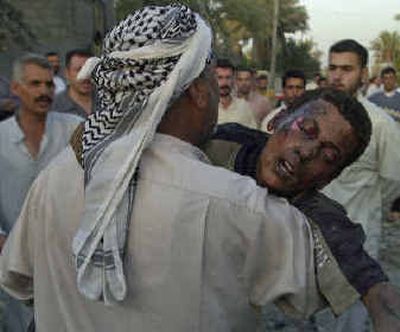Strikes kill eight in Iraq

BAGHDAD, Iraq – On a day when five more American service members were reported killed in Iraq, U.S. airstrikes in Fallujah early Saturday killed eight people and wounded 15, including women and children, according to Iraqi reports.
The strikes had targeted followers of Iraq’s most-wanted militant and other insurgents. There was no word on whether any militants were killed in the U.S. attacks.
In western Iraq, four Marines were killed Friday and an American soldier died Saturday in a homemade bomb explosion in the capital, the U.S. military said. The Marines died in three separate incidents during security operations in Anbar province. No further details were provided.
Also on Saturday, gunmen killed seven Iraqi National Guard recruits who were being driven by van to their new post in western Baghdad, officials said. The attack was part of an escalating campaign to derail creation of an Iraqi force to take over security operations from the American-led coalition.
Amid the latest round of violence, Muslim leaders from Britain arrived in Baghdad on Saturday in a bid to save British hostage Ken Bigley. The contractor’s two American co-workers were beheaded in recent days by Tawhid and Jihad, the most feared Iraqi insurgent group, headed by Jordanian-born Abu Musab al Zarqawi.
It was Zarqawi’s operatives that U.S. military officials said they targeted in the 4 a.m. strike in Fallujah, some 30 miles west of Baghdad. The military said in a statement that there were no “innocent civilians” in the immediate area at the time of the strike.
“Intelligence sources reported that Zarqawi terrorists were using the site to plan additional attacks against Iraqi citizens and multinational forces,” the military said. Attempts were made “to minimize collateral damage and civilian casualties.”
U.S. forces also launched an air strike at a Fallujah house from which small arms and rocket-propelled grenades were fired, the military said. No troops entered the city, as has been the case since the end of a three-week siege of Fallujah in April that left hundreds dead.
In the city, loudspeakers blared prayers to comfort residents as the bombs fell. At least two buildings in the city center were destroyed, witnesses told Arabic-language television. News footage showed Iraqis digging through the ruins of one structure, pulling out survivors. Two women and two children were among those rescued.
Later, another U.S. air strike just after 10 p.m. local time destroyed a key meeting place for Zarqawi operatives, the U.S. military said. At least 10 militants were at the site and secondary blasts indicated explosives and weapons were stored there, the military said.
Meanwhile, an Arabic-language Web site claiming to be a mouthpiece for Tawhid and Jihad announced Saturday that Bigley had been executed and seven British troops taken captive. British officials questioned the veracity of the statement, however, adding that all of its forces were accounted for. Independent confirmation was impossible.
Two British Muslim negotiators arrived in Baghdad on Saturday night to try to win Bigley’s release.
“We want to get our message to the abductors, and the message is simple, it is a humanitarian one,” said Daoud Abdullah, Assistant Secretary-General of the Muslim Council of Britain. “He was a non-combatant (and) Islam does not endorse the capture of non-combatants, let alone the killing of them.”
The kidnappers executed Americans Eugene Armstrong and Jack Hensley and threatened to do the same to Bigley unless all women prisoners held by U.S. forces in Iraq are freed. Iraqi and U.S. officials say there are only two women in U.S. custody. They are charged in connection with chemical and biological weapons production under Saddam Hussein’s regime.
In another development late Saturday, the U.S. military said it had sentenced a U.S. soldier in Tikrit to 25 years in prison for murder. Spc. Federico Merida was convicted of killing an Iraqi National Guardsman in May at a multinational forces base near the northern city of Ad Dawr.